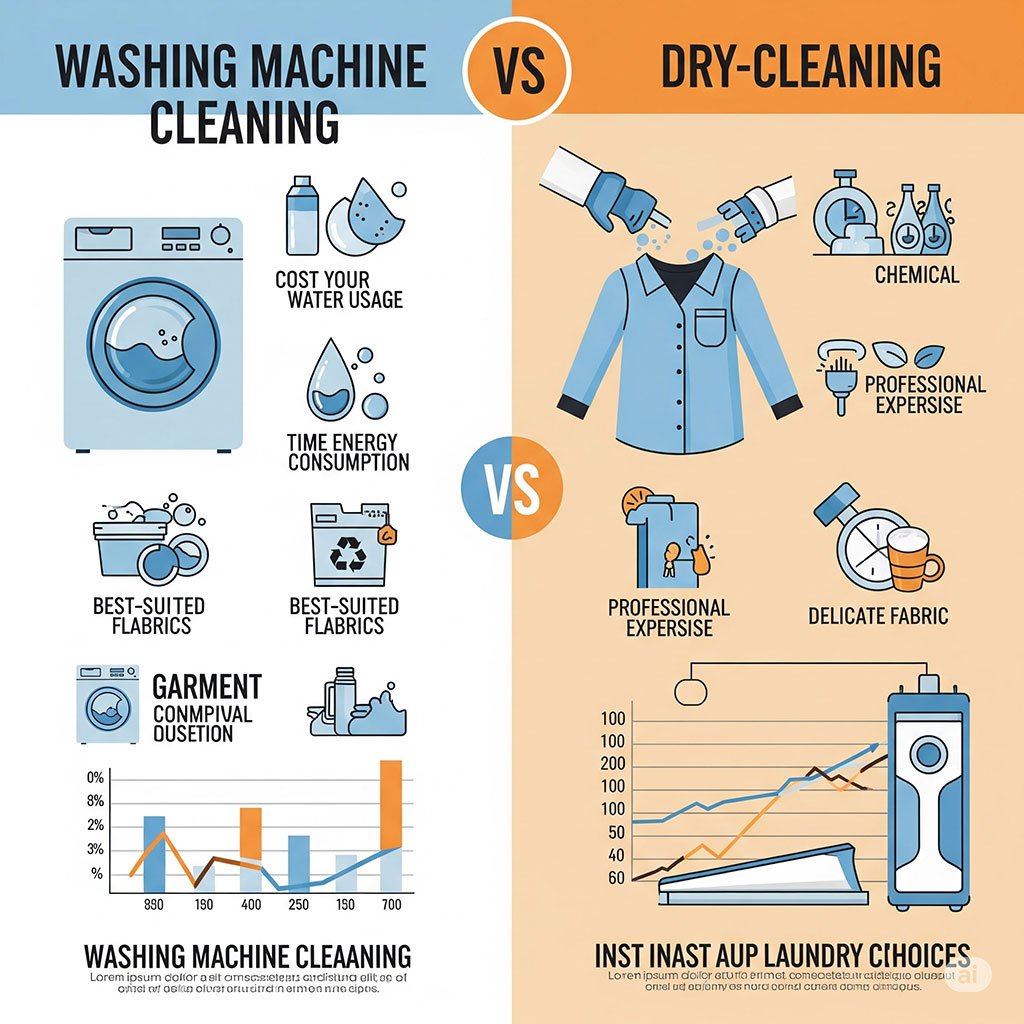Tired of laundry day dilemmas? Choosing between your trusty washing machine and professional dry cleaning can be confusing, but understanding their unique benefits and drawbacks will empower you to make the best decision for your garments and your wallet. Say goodbye to guesswork and hello to pristine clothes!
When it comes to keeping our clothes clean, two primary methods often come to mind: Washing Machine vs Dry Cleaning, the traditional washing machine and the specialized process of dry cleaning. While both aim to refresh and restore garments, they employ fundamentally different approaches and are suited for distinct types of fabrics and stains. This comprehensive guide will delve into the intricacies of each method, helping you navigate the world of fabric care with confidence.

Table of Contents
Washing Machine-The Everyday Hero
Washing machine, a staple in most households, utilizes water, detergent, and agitation to remove dirt, grime, and odors from fabrics. This method is incredibly versatile, efficient, and cost-effective for a vast array of everyday clothing.
How it Works:
- Water Immersion: Garments are fully submerged in water.
- Detergent Action: Detergents, often alkaline, break down dirt and grease.
- Mechanical Agitation: The machine’s drum tumbles or agitates the clothes, physically dislodging particles.
- Rinsing: Clean water flushes away the loosened dirt and detergent.
- Spin Cycle: High-speed spinning removes excess water, preparing clothes for drying.
Advantages of Using a Washing Machine:
- Cost-Effective: Generally much cheaper per item than dry cleaning.
- Convenience: Can be done at home, on your schedule.
- Versatility: Suitable for a wide range of fabrics like cotton, linen, synthetics, and many blends.
- Effective on Water-Soluble Stains: Excellent for removing common spills like food, drinks, and sweat.
- Hygiene: Hot water washes and certain detergents can effectively sanitize clothes.
Disadvantages of Using a Washing Machine:
- Fabric Damage Risk: Can shrink, stretch, or fade delicate fabrics, wool, silk, and embellished garments if not handled correctly.
- Limited Stain Removal: Less effective on oil-based stains, grease, or ink.
- Water Usage: Requires significant amounts of water.
- Energy Consumption: Uses electricity for heating water and running cycles.
- Time-Consuming: Includes wash, rinse, spin, and often a separate drying process.
Ideal Garments for Washing Machine:
- Everyday wear: T-shirts, jeans, socks, underwear.
- Bedding and towels.
- Cotton shirts and dresses.
- Most synthetic activewear.
- Durable blends.
Dry Cleaning-Specialized Solution
Dry cleaning, despite its name, is not a “dry” process in the sense of using no liquid. Instead, it uses specialized liquid solvents (most commonly perchloroethylene, or “perc,” although newer, more eco-friendly solvents are emerging) instead of water. This method is particularly adept at handling delicate fabrics and oil-based stains that water can exacerbate.
How it Works:
- Pre-treatment: Stains are identified and pre-treated with specific spot removers.
- Immersion in Solvent: Garments are tumbled in a machine filled with a minimal amount of a chemical solvent.
- Mechanical Action: The solvent, along with mechanical agitation, dissolves and lifts dirt and oils.
- Extraction: The solvent is extracted from the garments.
- Drying and Finishing: Clothes are tumble-dried and then pressed or steamed to restore their shape and finish.
Advantages of Dry Cleaning:
- Fabric Preservation: Ideal for delicate fabrics like silk, wool, rayon, velvet, and intricate garments that can be damaged by water and agitation.
- Superior Stain Removal: Highly effective on oil, grease, wax, and other solvent-soluble stains.
- Prevents Shrinkage and Fading: Reduces the risk of shrinking, stretching, or color bleeding common with water-based washing.
- Maintains Garment Shape: Helps maintain the original shape and drape of tailored clothing like suits, blazers, and formal wear.
- Professional Finish: Clothes often return professionally pressed and ready to wear.
Disadvantages of Dry Cleaning:
- Higher Cost: Significantly more expensive per item than washing at home.
- Chemical Exposure: Uses chemical solvents, which require proper handling and ventilation. Some individuals may be sensitive to residual odors.
- Less Convenient: Requires a trip to a dry cleaner and typically takes longer than a home wash.
- Not Ideal for Water-Soluble Stains: May not be as effective on sweat, food residues, or other water-soluble stains unless specially pre-treated.
- Environmental Concerns: Traditional solvents like perc have environmental implications, though the industry is moving towards greener alternatives.
Ideal Garments for Dry Cleaning:
- Suits, blazers, and tailored jackets.
- Dresses made of silk, rayon, or delicate blends.
- Wool coats, sweaters, and scarves.
- Items with intricate beading, sequins, or delicate embellishments.
- Velvet and other delicate upholstery fabrics.
- Ties and scarves.

Comparision: Washing Machine vs Dry Cleaning
To further clarify the differences, here’s a comparative table:
Feature | Washing Machine | Dry Cleaning |
|---|---|---|
Cleaning Medium | Water, detergent | Chemical solvents (e.g., perc, hydrocarbon) |
Cost (per item) | Low | High |
Convenience | High (at home) | Low (requires a trip to a cleaner) |
Fabric Suitability | Durable fabrics: cotton, linen, synthetics | Delicate fabrics: silk, wool, rayon, embellished |
Stain Removal | Excellent for water-soluble stains | Excellent for oil/grease/solvent-soluble stains |
Shrinkage/Damage | Higher risk for delicates if not handled correctly | Low risk |
Environmental Impact | Water usage, detergent runoff | Chemical solvent use (though improving) |
Finish | Home-finished (requires ironing) | Professionally pressed and shaped |
Factors to Consider When Choosing
When deciding between your washing machine and dry cleaning, several factors should influence your choice:
- Fabric Type: This is the most crucial factor. Always check the care label! If it says “Dry Clean Only,” heed the advice. If it allows for machine wash, consider the fabric’s durability.
- Stain Type: For oily or greasy stains, dry cleaning is often superior. For everyday dirt and water-soluble spills, a machine wash is usually sufficient.
- Garment Construction: Tailored items, structured garments, or those with delicate embellishments are best left to dry cleaners to maintain their shape and integrity.
- Cost: Factor in the ongoing expense. Regular dry cleaning can add up significantly.
- Convenience and Time: If you need a quick refresh for everyday items, the washing machine is faster. For specialized items, a trip to the dry cleaner is necessary.
- Personal Preference: Some people prefer the fresh feel of machine-washed clothes, while others value the crisp finish of dry-cleaned garments.
- Environmental Concerns: If environmental impact is a significant concern, research dry cleaners that use eco-friendly solvents or opt for hand washing delicate items at home if suitable.
Final Verdict
The choice between a washing machine and dry cleaning boils down to the specific needs of your garment. For everyday, durable items, the washing machine offers unparalleled convenience and cost-effectiveness. For delicate fabrics, structured clothing, or tough oil-based stains, dry cleaning provides the specialized care needed to preserve your investments. Understanding the strengths and weaknesses of each method empowers you to be a more informed and effective clothes caretaker.
FAQ
Generally, it’s not recommended. “Dry Clean Only” labels usually indicate that the fabric or garment construction is too delicate for water, agitation, or heat, and attempting to wash it at home can lead to shrinkage, damage, or color bleeding.
No. Dry cleaning is highly effective on oil-based stains (grease, makeup, ink), but water-soluble stains (sweat, food, drinks) may require pre-treatment or a professional wet cleaning process for optimal removal.
It depends on how often you wear them and if they have visible dirt or odors. For suits, cleaning every 3-4 wears or seasonally is a good rule of thumb. Formal wear worn for special occasions can be cleaned after each use to maintain freshness.
Look for labels indicating “Dry Clean Only,” delicate fabrics like silk, wool, rayon, velvet, or linen. Garments with intricate embellishments, delicate lace, fine tailoring (suits, blazers), or specific stains like oil or grease are also strong indicators.
Yes, many dry cleaners now offer environmentally friendly options such as hydrocarbon cleaning, silicone-based solvents (like GreenEarth), liquid CO2 cleaning, and professional wet cleaning, which uses water but with highly controlled processes.
Bottom Line
When you navigate fabric care, especially the decision between washing machine vs dry cleaning, focus on what your garments truly need. Your washing machine handles daily wear effectively. Dry cleaning, on the other hand, provides specialized care for delicate items and stubborn stains. By choosing wisely, you keep your clothes looking great, extend their lifespan, and ensure you always look your best.



Leave a Reply